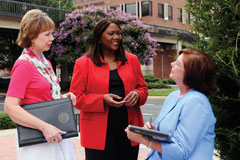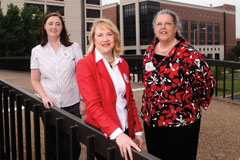Collaborative Research at the UAB School of Nursing
 |
Carol Dashiff, Gwen Childs, and Jackie Moss |
Professor Carol Dashiff, Ph.D., R.N., works as a senior scientist with the Center for Health Promotion, the Center for Advancement of Youth Health, the Cystic Fibrosis Research Center, and the Minority Health and Health Disparities Research Center and as a senior scholar at the Pan American Health Organization/World Health Organization Collaborating Centre. She was recently awarded an R21 grant from the NIH-National Institute of Nursing Research for a two-year study titled “Multifamily Group Autonomy Support Psychoeducation for Parents and Middle Adolescent with Type 1 Diabetes.” The grant will refine, pilot, and assess the feasibility of a program to facilitate adolescent self-management of Type 1 diabetes and diabetes control in the transition from middle to late adolescence. “I am currently collaborating with two endocrinologists in UAB’s Department of Pediatrics on the project,” Dashiff says. Her co-investigator is School of Medicine endocrinologist Hussein Abdullatif, M.D., recipient of the 2009 President’s Award for Excellence in Teaching. They are assisted by SON faculty members David Vance, Ph.D., M.S.G., who specializes in psychology, and Andres Azuero, Ph.D., M.B.A., who has spent five years at UAB focusing on clinical trials and statistical genetics.
Jacqueline Moss, Ph.D., R.N., whose appointments include the Center for Aging and the Center for Outcomes and Effectiveness Research and Education, is currently involved in a project with the Center for Clinical and Translational Science (CCTS) in the area of health informatics and the coordination and development of online courses for research education. “The major goal of the CCTS is to enhance the translation of science into clinical practice,” Moss says. “And there is a need to train people to be translational scientists so that it doesn’t take years to get scientific findings implemented into practice. Most recently we’ve been developing an online course that teaches instructors how to teach online.”
Gwen Childs, Ph.D., R.N., an assistant professor, will be participating in an upcoming project with Linda Moneyham, D.N.S., R.N., F.A.A.N., in collaboration with the Center for AIDS Research. “The project is a research interest group that will focus on writing grants that address issues related to HIV and obesity,” Childs says. “I am currently analyzing the data from a qualitative study, which focused on the sexual encounters of young African-American women age 19 to 24. Specifically, this study explored the psychosocial factors surrounding their decisions to initiate sexual activity during the early adolescent years. The study further explores the impact of early sexual debut on the women’s current intimate relationships. It also explores the past and current sexual risk-taking behaviors of these women.”
 |
Michele Montgomery, Marti Rice, and Anne Turner-Henson |
According to project director Anne Turner-Henson, D.S.N., R.N., a professor in the Department of Community Health, Outcomes and Systems, there is a critical shortage of nursing faculty right now, particularly in maternal/child health. “We’ve designed this grant to prepare the next generation of child-health nursing faculty who are leaders in nursing education and biobehavioral research,” she says. “This program leverages the existing UAB School of Nursing Ph.D. program along with LECHN courses that focus on developing knowledge, research, and leadership skills in child health and nursing education. Through the UAB/MCH network, we’ve been able to offer students innovative, interdisciplinary, collaborative, cooperative learning experiences.”
Marti Rice, Ph.D., R.N., a professor in the Department of Family/Child Health and Caregiving and LECHN faculty member, adds, “The LECHN-funded fellowships include a wide array of experiential activities and responsibilities, including child-health research, teaching, grant-writing seminars, and even community advocacy.”
LECHN fellow Michele Montgomery, Ph.D., MPH, R.N., is a recent graduate of the B.S.N.-to-Ph.D program. “The B.S.N.-Ph.D. program was a good fit for me because I already had a master’s degree in public health and I wasn’t interested in being a nurse practitioner,” she says. “And I felt the LECHN fellowship would build my knowledge base and research skills in the area of children’s health. I plan to assume a faculty position in child-health nursing and to build a program of research in this area.”
This article originally appeared in UAB Nursing, the magazine of the UAB School of Nursing. See the issue in pdf form here.